Registered under Societies Registration Act of 1860 ( No. 28 of 1977-78) and (No. 114 of 2004-05).
It is a union of Presbyterian Churches formed to bind together different churches in India in one body with a view to present a united living testimony to Christ and worthily to represent to the world the Christian ideal.
It has been in existence since 1924 and has its branches in different parts of India.
In the 18th and 19th centuries the Christian Missionaries came to India from America, Canada, Scotland, Ireland, New Zealand, England, Wales and Australia etc.
These missionaries constituted churches in the different parts of the Indian Union and named them according to the sponsoring missions.
These churches were formed through the work and witness of the following Missions in Northern India.
- American Evangelical and Reformed Church.
- American Marathi Mission of the American Board of Commissioners for Foreign Missions.
- American Presbyterian Mission
- Canada Presbyterian Mission
- Church of Scotland Mission
- Irish Presbyterian Mission
- London Missionary Society
- English Presbyterian Mission
- New Zealand Presbyterian Mission
- United Church of Canada Mission
- Welsh Presbyterian Mission
A joint conference of Presbyterian Church in India met at Allahabad on November 20 ,1918. Those present at this conference proposed Union between the Presbyterian Church, South India United Church (SIUC) Western India Congregational Churches and L.M.S. The name ‘ The United Church’ in India is suggested as the most suitable name for the new United Church. The name 'General Assembly' is suggested for the supreme body of the church, term 'Synod' is the best name for the bodies intermediary between the councils, presbyteries and General Assembly. .
The functionaries purchased properties and started/constructed churches, hospitals, schools and colleges, orphanages, leprosy homes and graveyards etc. They all kept working as per their own denominations. The properties of the above functionaries/ churches were managed and looked after by commission on Ecumenical mission and relations of United Presbyterian Church in United State of America (C.O.M.E.M.A.R.) which is also known as " The Board of Foreign Mission and also known as "Punjab Mission."
On December 30, 1924 the above said churches of Presbyterian faith along with Indian Christians who had faith in Presbyterian doctrine, formed a new body called United Church of Northern India (UCNI).
The second UCNI General Assembly was held in 1926 under the chairman ship of Rev. Allen Hume, Moderator of UCNI. The draft constitution was read over and was accepted in the Henrietta Colburn Hall of Hume Church in Ahmednagar ( Maharastra). In 1928, the same constitution was printed and published and since the cover of the book was blue ,the people called it Blue Book instead of Rules & Regulations of UCNI. It was framed so that all the churches follow the same customs and traditions and the way of worship and the administration of the church.
The constitution framed is based on the democratic principals. The democratic set up are as under:
a)
The congregation of local church which consists of the representatives of various villages and cities in a zone.
b) Synod which consists of the representatives of al synods. General Assembly is the supreme body of the UCNI formed at national level.
In the year 1938 the UCNI floated a Trust namely United Church of Northern India Trust Association (U.C.N.I.T.A.) to manage and look after the properties of its principals U. C.N.I. The said Trust was registered under company Act 1913 at Bombay vide Registration No. 2912/1938-39. In the year 1938-39, there was no Trust Act, as such it was registered under company Act. In the year 1950, the Indian Government enacted Bombay Public Trust Act and the U. C.N.I. T.A. was registered at Bombay under Bombay Public Trust Act vide Registration No. D-97/1955.
In the year 1956, a function was held on 21/22 November at Ludhiana. Dr. H.J.Strickler, a chosen representative of Punjab Mission turned over a gavel (a symbol of responsibility as well as authority) to Rev. S.N. Talib-ud-Din, Moderator of Punjab Synod.
Since then the authority to manage and look after the properties was handed over to Punjab Synod UCNI. These properties are situated at Punjab, Haryana, Himachal Pradesh, Uttar Pradesh, part of J& K in the forms of churches, schools, colleges, hospitals, graveyards, orphanages, leprosy homes etc. All the above said organizations are working directly under the UCNI. In the year 1971, the board of foreign mission furnished deeds and transferred its properties to the UCNI through trustee of UCNITA agent body.
In the year 1970, a few priests left the actual UCNI who had formed a new organization and started functioning independently under the name of Church of North India. They had separate faith, separate constitution and separate trust namely CNITA that had nothing to do with the properties of UCNI. The members of CNI started falsely that UCNI has merged into CNI. The priests and member of actual UCNI had strongly opposed the false and misleading of merger and hon'ble courts of India rejected this concocted story of merger.
Objective of U. C.N.I
To bind together different churches in India in one body with a view to present a united living testimony to Christ and worthily to represent to the world the Christian Ideal.
U. C.N.I 's Confession of Faith
We accept the following confession of faith as the basis of union and as embodying substantially the vital truths held the uniting churches.
1. Of God
We believe in one God, who is a personal spirit, infinite, eternal and unchangeable in his being and perfections; the Lord Almighty, most just in all His ways, most glorious in holiness, unsearchable in wisdom, plenteous in mercy, full of love and compassion and abundant in goodness and truth. We acknowledge Him; father, Son, and Holy Spirit.
2. Of Revelation
We believe that God, who manifests Himself in creation and providence and especially in the spirit of man, has been pleased to reveal His mind and will for our salvation in various ways with ever growing fullness and that the record of this revelation, so far as is needful for our salvation, is contained in the scriptures of the Old and New Testaments, which are therefore to be devoutly studied by all; and we reverently acknowledge the Holy Spirit speaking in the Scriptures to be supreme authority in matters of faith and duty.
3. Of Divine Purpose
We believe that the purpose of God embraces all events, so that while the freedom of man is not taken away, nor is God the author of sin, yet in His providence, He makes all things work together to the fulfillment of His sovereign design and the manifestation of his glory.
4. Of Creation and Providence
We believe that God is the creator, Upholder and Governor of all things; and that He made man in His own image, meet for fellowship with Him, free and able to choose between good and evil and responsible to Him.
5. Of The Sin of Man
We believe that all men have sinned and come short of the glory of God, having manifold ways offended against God's good and holy law, and that out of this condition no man is able to deliver himself.
6. Of The Grace of God
We believe that God out of His great love for the world, has given His only begotten Son to be the Saviour of sinners, and in the Gospel freely offers His all-sufficient salvation to all men.
7. Of Lord Jesus Christ
We believe in the Lord Jesus Christ, the eternal Son of God, who for us men and for our salvation was conceived of the Holy Spirit, became man, yet without sin, the only true incarnation of God, He through, His word and through His perfect obedience did reveal the Father and by His life, death and resurrection did establish the way by which men may obtain forgiveness of in and the gift of eternal life; He ascended into heaven where He ever liveth to make intercession for us.
8. Of The Holy Spirit
We believe in the Holy Spirit, the Lord and Giver of life, who moves upon the hearts of men to restrain them from evil and to turn them unto good, to convict the world of sin, to enlighten men's minds in the knowledge of Christ and to persuade and enable them to obey the call of the Gospel; He abides with the church, dwelling in every believer as the spirit of truth, of holiness, of comfort and of love.
9. Of The Christian Life
We believe that, being born again by the spirit of God, we become new creatures in Christ Jesus, trusting in Him alone for our salvation, confessing and forsaking our sins, with a sincere purpose to do the will of God; we believe that God pardons our sins on the ground of the perfect obedience and sacrifice of Christ and that we are adopted as sons of God and grow into the likeness of Christ through fellowship with Him and the indwelling of the Holy Spirit.
10. Of The Church
We acknowledge one holy Catholic Church, the innumerable company of saints of every age and nation, who being united by the Holy Spirit to Christ their Head, are one body in Him, and have communion with their Lord and with one another. Further we receive it as the will of Christ that His Church on the earth should exist as a visible and sacred brotherhood, consisting on those who confess faith in Jesus Christ and obedience to Him, and organized for the confession of His name, for the public worship of God, for the administration of the sacraments, for the upbuilding of believers, for the universal propagation of the Gospel and for the service of man, and we acknowledge as a part of this universal brotherhood every church throughout the world which professes this faith in Jesus Christ and obedience to Him as Divine Lord and Saviour.
11. Of The Sacraments
We believe that our Lord, Instituted sacraments of Baptism and the Lord's Supper. Baptism is a sign and seal of the union with Christ and our renewal by the Holy Spirit.
The Lord's Supper is a memorial of Christ's death and is means of grace to those who partake in faith, and is to be observed by His people till He comes.
12. Of The Resurrection and Judgment
We believe in the resurrection of the dead, both of the just and the unjust, and that Christ shall judge the living and the dead; who shall come forth, they that have done good unto the resurrection of life, and they that have done evil unto the resurrection of judgment.


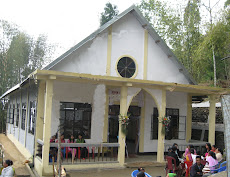





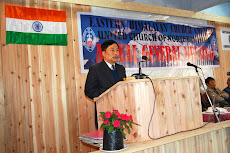







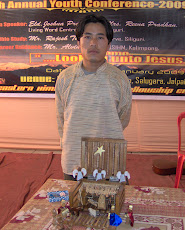











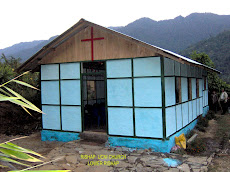


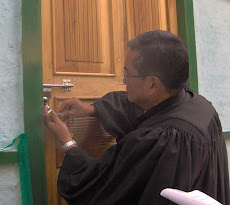





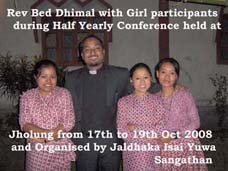



No comments:
Post a Comment